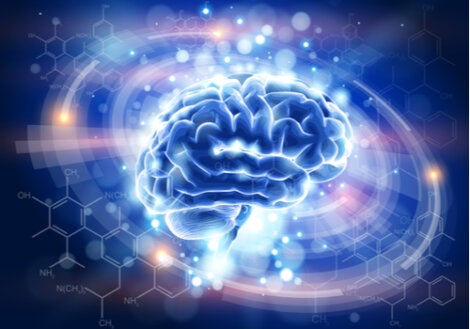The Neuroscience of Emotional Pain: Silent Suffering


Written and verified by the psychologist Valeria Sabater
The neuroscience of emotional pain tells us that emotional suffering has the same impact on the brain as physical pain. As a matter of fact, experiences such as the anguish over the loss of a loved one or the impact of accumulated stress at work can take longer to heal than a broken bone.
Few topics are as controversial as the psychological understanding of pain. Indeed, as a society, we only tend to give credence to what we can see. For this reason, realities such as chronic pain, lupus, or fibromyalgia often fall into the social category known as socially invisible chronic diseases.
However, we can’t ignore the suffering linked to mental disorders or even certain emotional impacts we suffer from time to time.
As a matter of fact, the person with depression also feels pain. Take, for instance, the patient with bipolar disorder who’s just been fired from their job. In fact, these kinds of situations can lead to a series of intense, adverse, and highly painful emotions.
Emotional pain isn’t seen or heard, but we know it’s real. Furthermore, there’s a neurological imprint that proves this fact, and we’re currently learning more and more on the subject.
“Who knows about pain, knows everything.”
-Dante Aligheri-
The suffering brain
There are pains for which pain relievers are useless. Also, there are wounds that you can’t locate in your body, but you know that they’re there, somewhere. In fact, they’re bleeding invisibly and cutting off your momentum.
The neuroscience of emotional pain is a relatively new field that attempts to answer many of the questions surrounding emotional pain.
The insula and cingulate cortex
All your experiences, your perception, and even your thoughts end up being filtered and processed by a small structure in your brain. This is the insula. It gives each of these processes an emotional imprint. Consequently, you attribute them as either pleasant or unpleasant.
However, on occasions, when your emotional intensity is extremely high, it joins the cingulate cortex and generates a specific sensation of pain. This experience, as pointed out in a study conducted by the Wake Forest University School of Medicine (United States), is the same as that which occurs with a physical injury.
The authors of this work point out something else that’s extremely interesting. They state that much of your physical pain also generates emotional pain. For example, if you hit your toe against a door, you feel frustrated and even angry. In fact, you’ll probably reprimand yourself for being too clumsy.
Rejection hurts like a burn
When we talk about rejection, we’re not just referring to being abandoned by your partner or rejected by a person you like. As a matter of fact, incidences such as bullying, are a clear example of how you can become separated, isolated, and attacked by a social group. Remember, your brain is an organ that needs social contact and meaningful connection with others.
- For this reason, experiencing social rejection generates a serious neural impact. As a matter of fact, the neuroscience of emotional pain tells us that suffering in these cases is immense. Indeed, Dr. David T. Hsu, of the University of Michigan (United States) claims that, in these cases, the brain reacts in the same way as if it had experienced a physical burn.
- What’s more, it’s been observed that the brain generates an analgesic response. In fact, it releases a large number of opioids to alleviate the pain.
Therefore, we can say that social rejection shapes multidimensional suffering. For example, the socially rejected person not only feels emotionally hurt. In addition to the psychological pain, they experience fatigue, concentration problems, sleep disturbances, and even muscle numbness.

When your brain suffers, your body suffers
The neuroscience of emotional pain claims that the brain is a highly sophisticated organ. It’s intricately connected to your entire body. In fact, its connections travel from the brain stem and spinal cord to almost any part of your body.
Likewise, the circulatory and lymphatic systems are the ones that transmit hormones released by tyour brain. This means that emotions, being chemical responses, don’t stay in your brain space. They pass through it and reach many parts of your body.
For this reason, it’s extremely difficult for your body to be immune to emotional pain. Indeed, its imprint always arrives. Furthermore, it’s always noticeable and inevitably generates some kind of change in you.
The neuroscience of emotional pain tells us that emotional suffering has the same impact on the brain as physical pain. As a matter of fact, experiences such as the anguish over the loss of a loved one or the impact of accumulated stress at work can take longer to heal than a broken bone.
Few topics are as controversial as the psychological understanding of pain. Indeed, as a society, we only tend to give credence to what we can see. For this reason, realities such as chronic pain, lupus, or fibromyalgia often fall into the social category known as socially invisible chronic diseases.
However, we can’t ignore the suffering linked to mental disorders or even certain emotional impacts we suffer from time to time.
As a matter of fact, the person with depression also feels pain. Take, for instance, the patient with bipolar disorder who’s just been fired from their job. In fact, these kinds of situations can lead to a series of intense, adverse, and highly painful emotions.
Emotional pain isn’t seen or heard, but we know it’s real. Furthermore, there’s a neurological imprint that proves this fact, and we’re currently learning more and more on the subject.
“Who knows about pain, knows everything.”
-Dante Aligheri-
The suffering brain
There are pains for which pain relievers are useless. Also, there are wounds that you can’t locate in your body, but you know that they’re there, somewhere. In fact, they’re bleeding invisibly and cutting off your momentum.
The neuroscience of emotional pain is a relatively new field that attempts to answer many of the questions surrounding emotional pain.
The insula and cingulate cortex
All your experiences, your perception, and even your thoughts end up being filtered and processed by a small structure in your brain. This is the insula. It gives each of these processes an emotional imprint. Consequently, you attribute them as either pleasant or unpleasant.
However, on occasions, when your emotional intensity is extremely high, it joins the cingulate cortex and generates a specific sensation of pain. This experience, as pointed out in a study conducted by the Wake Forest University School of Medicine (United States), is the same as that which occurs with a physical injury.
The authors of this work point out something else that’s extremely interesting. They state that much of your physical pain also generates emotional pain. For example, if you hit your toe against a door, you feel frustrated and even angry. In fact, you’ll probably reprimand yourself for being too clumsy.
Rejection hurts like a burn
When we talk about rejection, we’re not just referring to being abandoned by your partner or rejected by a person you like. As a matter of fact, incidences such as bullying, are a clear example of how you can become separated, isolated, and attacked by a social group. Remember, your brain is an organ that needs social contact and meaningful connection with others.
- For this reason, experiencing social rejection generates a serious neural impact. As a matter of fact, the neuroscience of emotional pain tells us that suffering in these cases is immense. Indeed, Dr. David T. Hsu, of the University of Michigan (United States) claims that, in these cases, the brain reacts in the same way as if it had experienced a physical burn.
- What’s more, it’s been observed that the brain generates an analgesic response. In fact, it releases a large number of opioids to alleviate the pain.
Therefore, we can say that social rejection shapes multidimensional suffering. For example, the socially rejected person not only feels emotionally hurt. In addition to the psychological pain, they experience fatigue, concentration problems, sleep disturbances, and even muscle numbness.

When your brain suffers, your body suffers
The neuroscience of emotional pain claims that the brain is a highly sophisticated organ. It’s intricately connected to your entire body. In fact, its connections travel from the brain stem and spinal cord to almost any part of your body.
Likewise, the circulatory and lymphatic systems are the ones that transmit hormones released by tyour brain. This means that emotions, being chemical responses, don’t stay in your brain space. They pass through it and reach many parts of your body.
For this reason, it’s extremely difficult for your body to be immune to emotional pain. Indeed, its imprint always arrives. Furthermore, it’s always noticeable and inevitably generates some kind of change in you.
All cited sources were thoroughly reviewed by our team to ensure their quality, reliability, currency, and validity. The bibliography of this article was considered reliable and of academic or scientific accuracy.
- Price, D. D. (2000, June 9). Psychological and neural mechanisms of the affective dimension of pain. Science. https://doi.org/10.1126/science.288.5472.1769
This text is provided for informational purposes only and does not replace consultation with a professional. If in doubt, consult your specialist.








